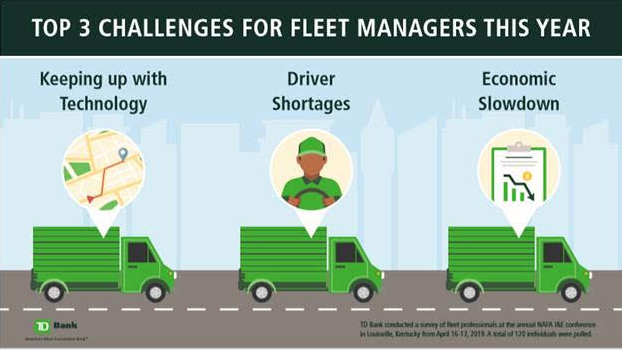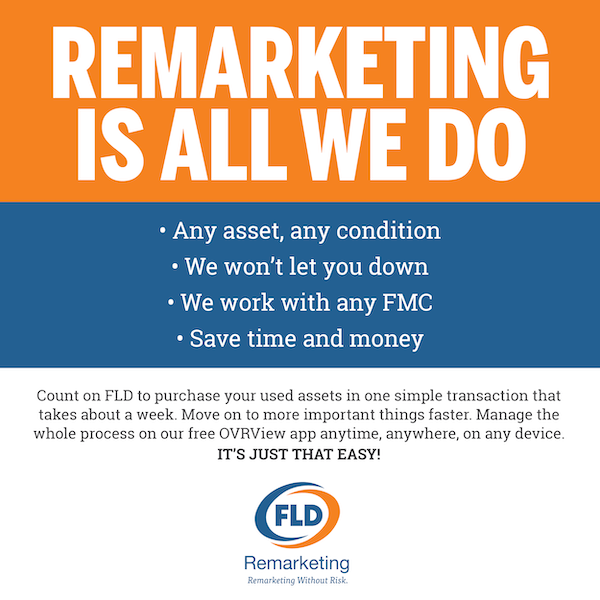
More than 60 percent see autonomous trucks going mainstream within 10 years
By Mark Boada, Executive Editor
Keeping up with rapid changes in automotive technology is the greatest challenge facing the transportation industry this year, according to a survey of 120 fleet managers conducted by TD Bank at the NAFA Fleet Management Association Institution & Expo held in Louisville, Kentucky, earlier this year.
Some 52 percent of the respondents identified technological change as their biggest challenge, compared to 21 percent who said it’s the driver shortage. These concerns dwarfed others that have grabbed headlines recently: just 13 percent said their biggest worry is a potential economic slowdown, while only 8 percent pointed to disruption caused by e-commerce, and 6 percent said it is changing foreign trade policies.
Perhaps the survey’s most surprising finding was about autonomous trucks: 61 percent said they see them as becoming mainstream within the next 10 years, with 27 percent saying they think they’ll become routine even sooner, within the next three to five years.
“The transportation industry is on the brink of a major transformation,” said Anthony Sasso, Head of TD Equipment Finance at TD Bank. “Traditionally, the industry has been defined by trucks and infrastructure, but the use of mobile devices, GPS and electronics have revolutionized logistics.
“Looking ahead, we anticipate that transportation companies will invest heavily in innovation to help fleets optimize routes, better track inventory and produce more fuel-efficient and driverless vehicles.”
Alternative fuels top of mind
When asked about adopting alternative fuels, like electricity and liquid natural gas, 45 percent said they would like to turn to them within the next three to five years. An additional 21 percent indicated that they would like to add alternative fuel but have found it to be cost-prohibitive.
“Alternative fueling is one of the hottest topics in the trucking industry today,” Sasso said, “and we’ve seen companies begin to explore fuel efficient and fuel-effective solutions to not only help control variable expenses, but also demonstrate their commitment to clean energy and the environment.”
“It’s evident that the incorporation of alternative fuel has moved from a mindset to more of a reality. With this shift, we can expect that companies will look to integrate fuel efficient trucks when their leases reach maturity and they look to replace and upgrade models.”
Consumer demands prompting changes
The survey also probed fleet managers’ plans for managing the size of their fleets this year. It found that one-third expect to increase it, 25 percent to decrease it and 17 percent to adjust its composition to favor last-mile delivery. Only 9 percent said they were adjusting their fleet size to favor long-haul delivery.
“Consumers have become accustomed to extremely quick, low- or no-cost delivery and shipping options,” Sasso commented. “For many transportation companies, this has resulted in a need to augment traditional long-haul delivery and incorporate shorter, quicker deliveries, known as last-mile delivery.”
“As the digital marketplace continues to evolve, it’s likely that transportation companies will need to continue to adjust business models and change their fleet size and composition to accommodate the fast, free and convenient delivery service that consumers demand.”
Financing preferences: shorter terms
In regard to equipment financing, 38 percent of the respondents said they weren’t sure what kind to use for future acquisitions. Slightly more than one out of five (21 percent) said they preferred a capital lease, 17 percent a fair market value lease, 12 percent a TRAC/Split TRAC lease and 10 percent favored a loan.
“In a competitive industry landscape and an environment of ever-changing consumer demands, fleet companies need flexibility in order to continue to meet the shipping needs of today and tomorrow.” Sasso said. “Companies are looking for flexible financial solutions that offer shorter term loans and the ability upgrade equipment frequently.”
For the complete survey report, contact Caitlin Day, VP, TD Bank Corporate Communications Manager, at [email protected]




